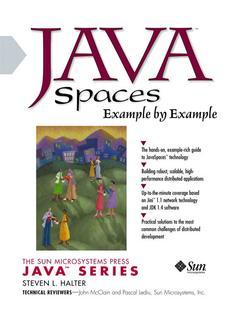JavaSpaces example by example
Auteur : HALTER Steven L.

The example-rich guide to JavaSpaces for working developers!
- Up-to-the-minute coverage based on Jini 1.1 and JDK 1.4.
- Advanced distributed/parallel programming techniques: optimization, security, deadlock avoidance, and making the most of parallelism.
- Technical reviewer: Sun Microsystems John McClain ("Mr. JavaSpaces") and Pascal Ledru, Sun Microsystems.
Steven I. Halter is Senior Staff Software Engineer at Imations Software Research and Development Rochester Laboratory, and co-author of Enterprise Java Performance (PH PTR). He formerly served as Staff Software Engineer for the IBM Software Systems Division, where he was a member of the SanFrancisco performance team. He holds ten issued U.S. patents.
I. GETTING TO KNOW JAVASPACES.
1. About JavaSpaces.2. Obtaining and Installing JavaSpaces.
3. JavaSpaces Basics.
4. More JavaSpaces.
II. DISTRIBUTED PROGRAMMING.
5. Encouraging Distribution.
6. Synchronization Issues.
7. Fairly Sharing Resources.
III. GOING TO THE NEXT LEVEL.
8. Parallel Computing.
9. Security Issues.
10. Wrapping It up.
Conclusion.
Index.
Date de parution : 12-2001
Ouvrage de 272 p.
18x23 cm



